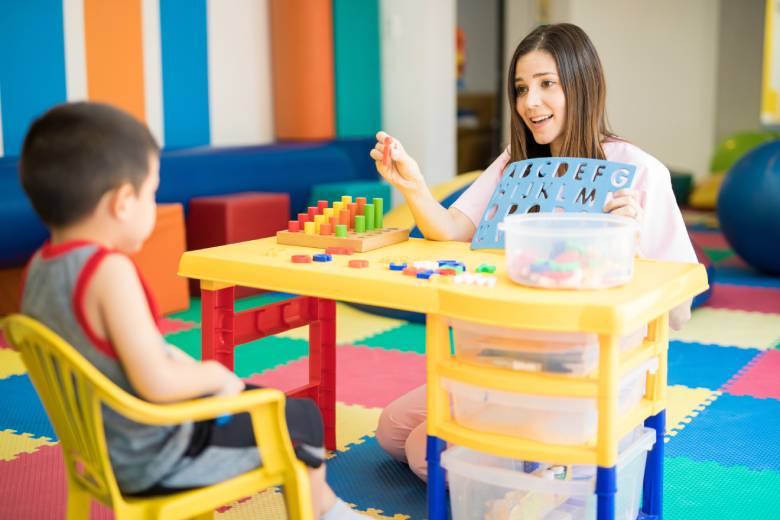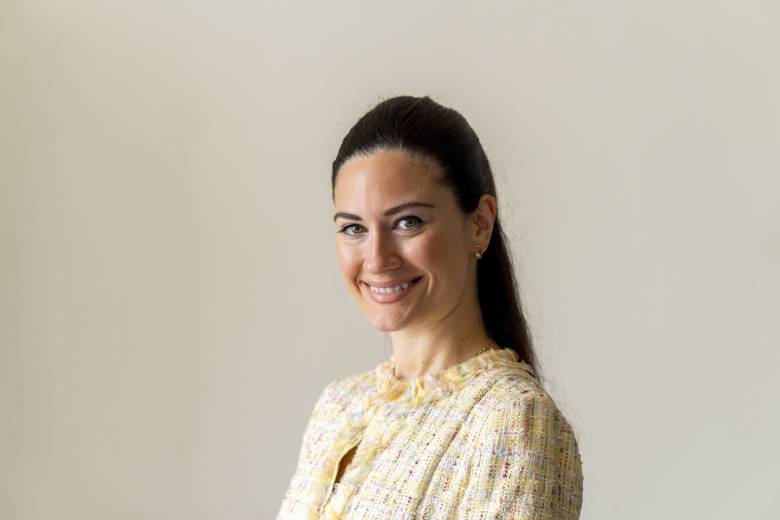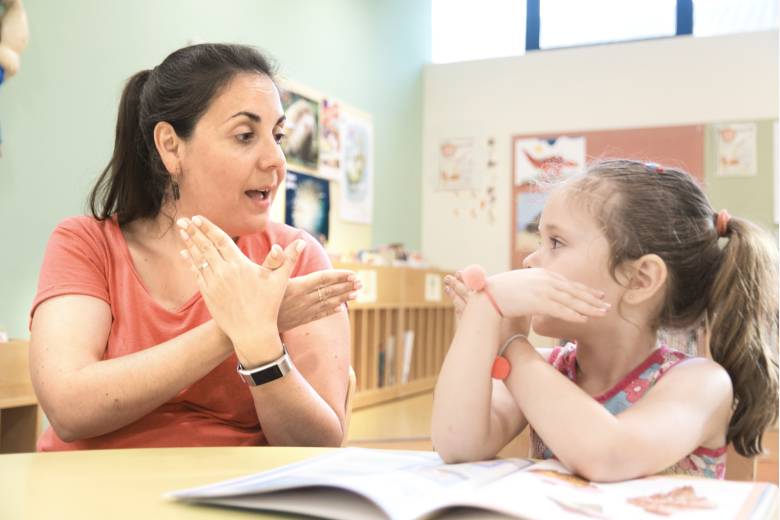Children with special educational needs (SEN) are those who require additional support and accommodations to help them access education and reach their full potential. These needs can arise due to various factors, including physical, cognitive, emotional, or behavioural differences.
The goal of special education is to ensure that all children, regardless of their abilities or disabilities, have access to an appropriate education that meets their individual needs. Education UAE spoke to Sofia Stigka, a CDALicensed Psychologist at the Thrive Wellbeing Centre, about how to identify such needs and what steps to take to put a child on the path to success and fulfilment.
EdUAE: Identifying special needs in children can be complex, as every child is unique and develops at their own pace, but if a parent feels there may be issues after their child has started school what are the first steps they should take?
Sofia Stigka: The beginning of school is undoubtedly a distressing time full of big emotions for the family. When school starts, it is important to give the child the time they need to adjust. While some children feel comfortable in the school right away, others may take longer to adjust. And both scenarios are equally fine. If, however, the challenges with adjustment remain or worsen despite the cooperation with the teacher, a parent can reach out to the school counsellor or seek support from a therapist. Prior to a parent’s visit to a wellbeing centre, it’s always helpful to monitor the child and take notes of any issues that they would like to discuss.
Valuable information such as the frequency of a concerning behaviour, daily situations that may trigger this behaviour, the caregivers’ reaction to it and the way it affects the family, can help any professional make the most out of a consultation while building a support plan. This can be implemented at home and in school, since ideally, we are looking for a strong collaboration between settings. Parents should also dedicate some time to briefly answer questions included in the intake form before their appointment with the therapist. In any case, seeking support and having open communication with the school staff and any other professional will help a parent feel empowered and aware of their child’s amazing skills and areas of improvement, strengthening their connection with their child.
Intellectually gifted children do too face challenges at school
EdUAE: Is it important for parents to familiarise themselves with typical developmental milestones for different age ranges – is this a good guideline?
SS: Parents are exposed to the concept of a normal pattern of growth and development from the day their child is born, from when they are handed the health card including the height and weight chart at the back! Expecting parents not to familiarise themselves with typical developmental milestones one way or another is not reasonable – parents observe their kids and inevitably compare their skills to the ones of their peers; parents talk to other parents about their kids’ abilities and skills; parents look up on search engines the information they want to get, particularly now that information is so easily accessible. That’s what parents do.
Developmental milestones offer guidance and clues about a child’s health. Knowing what is expected from a child at a certain age can help parents monitor their child’s developing skills and offer support to areas of improvement if needed. In that sense, developmental milestones and stage charts are useful tools. As with everything else in life, the problem starts when we see parents obsessing over milestones, expressing milestone anxiety – anxiety about their kid succeeding in a skill expected for their age. It is therefore important to remember that development is far less ‘linear’ than we think, but rather dynamic and variable. Each child develops at their own pace and developmental milestones are there to guide us, not to put pressure on us.

EdUAE: There are various developmental screening tools available that can help identify potential concerns – when should parents take advantage of these and should they be overseen by a professional or can parents carry them out themselves? Which screening tools do you suggest?
SS: Parents’ observations of their kids’ development can be excellent predictors of developmental delays, so they can access early intervention services on time. Early treatment can make a big difference in a child’s ability to acquire new abilities and skills and, similarly to the developmental milestones, screening tools can serve as good reference points of how a child’s social, emotional, physical and behavioural profile is developing. It is noteworthy that developmental monitoring and developmental screening are two different terms.
The signs of autism vary from child to child but typically there are some common symptoms that may indicate the need for further clinical exploration
Monitoring is an ongoing process throughout a child’s life and can be done across settings. Any adult around a child can monitor him or her, focusing on a particular behaviour or not. Screening is a more formal, structured process, typically done by a trained professional who can read and interpret the information correctly. The administrator ought to follow certain criteria while administering the tool and he/she should closely cooperate with the parents and teacher who will complete the clinical protocol – as those are reliable sources of information for the clinician. Although many screening tools are available for self-use online, a parent should use them with caution, keeping in mind the limitations of such results.
Typically, reliable standardised psychometric tools are copyrighted and can be purchased and used by licensed clinicians with appropriate credentials. Depending on the area/s of concern, different screening tools should be used. To name a few, The Ages and Stages Questionnaire – ASQ-3, the Battelle Developmental Inventory Screening Tool 2nd Edition – BDI-ST, and the Bayley Infant Developmental Screen – BINS, are tools that pinpoint a child’s developmental level across certain explored areas, while Gilliam Autism Rating Scale – GARS-3 and Modified Checklist for Autism in Toddlers -MCHAT are designed to identify children at risk for autism.
EdUAE: It is often suggested that children who have difficulty forming and maintaining social relationships or engaging in appropriate social behaviour might require specialised help – but could they just be shy? How can you tell at such an early age and do parents sometimes overreact?
SS: There are many reasons why a child might be struggling to form and maintain social relationships or abide by social rules. Social anxiety, neurodiversity, language difficulties and poor concentration are only some of the reasons why a child might be struggling to engage socially. These challenges, however, should not be confused with shyness or introversion. The key difference here is the severity of the symptoms. For instance, while shyness is considered a personality trait that is expressed with discomfort in social situations, autism is a more severe disorder that affects a child’s verbal and nonverbal communication skills, social interaction, learning and behaviour.
Another factor to consider is the consistency of the behaviours across settings; a shy kid may struggle in new environments, while a kid on the autistic spectrum typically displays particular behaviours on some level in all environments. Exactly because neurodiversity is so multifaceted, and because of all the attention it has received in the last decades, parents often express worry, even if a child does not fulfil the criteria for any clinical diagnosis. Even if parents sometimes overreact, it is crucial that they have access to a safe environment where their concerns can be heard and validated in a kind and respectful way.
Early treatment can make a big difference in a child’s ability to acquire new abilities and skills
EdUAE: How important, in an educational setting, is it to talk to teachers in order to gain insights into a child’s behaviour and development in a social and learning environment?
SS: It is essential that parents and teachers have a fine, reciprocal communication and share information about the child’s behaviours and needs at home and in school. Collaboration gives both sides the opportunity to exchange views, observations and comments about a child’s social skills, emotional stamina, resilience, academic attainments, and motivation. Since school is a sensory busy environment (at least much more than home is) with certain social expectations, parents can gain, through the teacher’s eyes, a better insight into their child’s social engagement, interactions and vulnerabilities. While for the child the benefits of parents teachers communication are evident, it is worth noting that adults can benefit too from such a partnership. Since they have a broader view of the child’s needs, they are given the opportunity to adjust and develop the skills to support the child’s needs and learning in a consistent and harmonious way.

EdUAE: If a parent feels that their child may be autistic, how do they find out where they are on the spectrum, what should they look for, and who do they consult?
SS: The signs of autism vary from child to child but typically there are some common symptoms that may indicate the need for further clinical exploration. These are the deficits in socio-emotional reciprocity, deficits in nonverbal communication, expressions of repetitive behaviours and mannerisms and an uncommon cognitive style with significant strengths and weaknesses. A formal diagnosis can only be achieved through a psychoeducational/ developmental assessment, conducted by a trained healthcare provider, typically an educational/clinical psychologist or a developmental paediatrician.
Such an assessment consists of a series of steps that are equally important in order to reach an accurate clinical conclusion. Through this process, the question that should be answered, actually, is not where a child is on the spectrum but what their unique skills are, how we can celebrate and capitalise on their strengths and how to support their vulnerabilities in the best possible way. Addressing a professional whom you can build a trusting relationship with, who cooperates closely with the school, who respects confidentiality, who recommends customised support, feedbacks and psychoeducates the adults around the child and follows up on the child’s progress are all crucial steps towards a successful intervention plan.
When school starts, it is important to give the child the time they need to adjust
EdUAE: People often think of children with special needs as youngsters who are struggling, but gifted children often possess intellectual abilities and cognitive skills that are significantly advanced for their age and this can cause them problems. When they ‘misbehave’ they could be just bored, couldn’t they? How do you approach the challenges that gifted children have?
SS: Intellectually gifted children do too face challenges at school, usually related to perfectionism, boredom, emotional and intellectual overexcitability, organisation and self-esteem due to the feeling of being different. Identifying the real needs of an intellectually gifted kid can indeed be tricky, and oftentimes these kids fly under the radar, or they are misunderstood. Some other times, they present accompanying to their giftedness difficulties (such as dyslexia or ADHD), presenting a profile known with the term ‘twice exceptional’. It is therefore important that these children’s skills are assessed too, in order to have access to a modified curriculum that will meet their academic, socio-emotional and sensory needs.
Remember that, the ultimate objective is to establish a setting that nurtures the child’s strengths and superior skills. Gifted children’s academic needs call for self-directed learning, enrichment into activities, and room for initiative and creativity. It is important to note that any adaptation of the curriculum needs to be implemented in an inclusive and discreet way, since differentiating a student’s academic life may trigger stress, self consciousness or put him or her in the spotlight. From a sensory point of view, gifted children may struggle to process intense stimuli when their senses are exposed to over-stimulating environments. Bright lights, loud noises, and rough material may cause discomfort to the bright child. Adults around the gifted kid should be aware of these sensitivities and adjust their environment accordingly.
EdUAE: Parents know their children best, so if they have concerns about their development or behaviour, how important is it to simply trust their instincts and seek professional advice?
SS: If you have concerns about any aspect of your child’s development, then you should not ignore your gut feeling! Seeking professional advice can only benefit a family, as the takeaways of a visit to a clinician are much-needed guidance and psycho-education around any concerned matter. Moreover, a clinician can suggest practical strategies to the parents or help them build an intervention plan together. If anything else, a worried parent should be treated with empathy, allowing enough space for them to express their anxieties.

Sofia Stigka is a CDA licensed psychologist with a master’s degree in child and adolescent psychology, as well as a postgraduate certificate in applied forensic psychology. She is an advocate for the wellbeing of children, their families and school communities. She has an interest in developing safe and inclusive school communities and was part of an EU research team that developed an anti-bullying programme in European schools.






